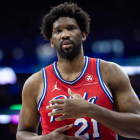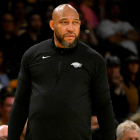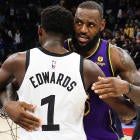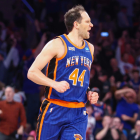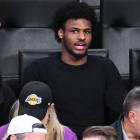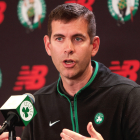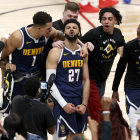
Louisville is the NBA's perpetual bridesmaid. The decades-long dance between the basketball-crazed city and the world's preeminent basketball league began in the mid-1970s. The ABA's Kentucky Colonels, one of the league's most decorated and financially successful franchises, were poised to make the jump into the NBA when the two leagues merged, but owner John Y. Brown decided to cash out by selling star players to other franchises and accepting a $3 million buyout to fold his team.
Decades later, Louisville had the then-Vancouver Grizzlies in hand in 2001. "We fumbled on the one-yard line," Steve Higdon, chairman of NBA2LOU, tells CBS Sports. A combination of local politics and the inability to raise funds for a new arena killed the deal, and the Grizzlies landed in Memphis. A year later, Rick Pitino and the University of Louisville exerted their own influence to keep the then-Charlotte Hornets out of Kentucky. Toss in a failed bid at the Houston Rockets, and the home of the 1975 ABA champions had grown sick of losing out on professional basketball.
So Higdon and other city officials took a trip. "We went on the road with the mayor, myself and all sorts of people and looked many of the top NBA arenas around America," Higdon says. "And we developed, if you will, a speculative arena." That arena is now a reality. The KFC Yum! Center now sits on the Louisville waterfront with all of the bells and whistles of a typical NBA arena, but no professional tenant. The trouble, as former Colonels legend and current NBA2LOU president Dan Issel explains, was a lack of interest on the NBA's part.
"As we got into it, we found out that expansion really wasn't anything, it wasn't as inevitable as everybody felt," Issel said. "In fact, I called the commissioner and he said 'Dan I really appreciate it, but I'm not even taking any meetings on expansion.'" This has been the NBA's official stance for over a decade. The league has not expanded since welcoming the Charlotte Bobcats in 2004, giving it an even 30 teams.
For most of those 16 years, expansion simply didn't hold any appeal. Adding teams is about adding cash. The NBA charges enormous fees -- hundreds of millions of dollars in the past, almost certainly in the billions should it ever do so in the future -- to give a new ownership group the right to create a team. The downside to doing so is that it decreases the value of all of the existing franchises. Revenue needs to be shared with an extra franchise. If the league doesn't need cash, it has no reason to share that revenue. Professional basketball has been so healthy in recent years that the notion of sacrificing long-term gains for short-term cash made no sense.
Enter the coronavirus. As the NBA scampers to put on a postseason, it is also considering how to recoup the millions of dollars it has already lost and the billions that are still on the line. Hundreds of televised games have already been canceled. More valuable postseason content is on the line if the virus forces the league into another cancellation. Even if everything goes off without a hitch, fans are almost certain to be excluded from arenas next season. That's an estimated 40 percent of league revenue down the drain. Suddenly short-term solvency is a very real concern for a number of teams. Expansion is the simplest way to infuse cash into the league.
But cities are struggling just as much as leagues are, and many of the logical locations the NBA might have considered under normal circumstances are facing unique challenges that hurt their viability as basketball markets. Las Vegas has already nabbed two professional sports franchises in recent years and stood out as a top choice should the NBA decide to expand, but its tourism-based economy is extremely precarious during a pandemic. Even if a vaccine is found tomorrow, how many potential visitors have the disposable income to go on a gambling trip right now?
Safety in Mexico City has always been a concern, but if the doubts over Orlando have proven anything, it's how little interest players have in spending extended periods away from their families. As economically tempting as placing a team in a city with nearly nine million inhabitants might appear, player pushback would likely be stronger than ever. Even expansion crown jewel Seattle, a proven NBA market, has to grapple with unprecedented social unrest. The rules governing prior expansion discussions are out the window right now.
Louisville has not been immune to these issues. No area has been. But the equation is tilting, and should expansion ever prove appealing or necessary, the need for stability is greater now than ever. A market like Louisville, so many times left at the altar by the NBA, can suddenly argue that traits previously viewed negatively may now be assets. A smaller city, in the context of sports, means less competition.
"If you look at the disposable income in a city like Charlotte, they have an NFL team as well as a professional basketball team, that's where you're divvying up the dollars," Higdon argues. "And you've got Duke, and you've got NC State, and you've got Wake. If you go to Oklahoma City and there's one professional team in the city, you see the type of support they get, and that's the sort of marketplace in Louisville. That's what it would look like here."
Whether Kentuckians would throw their dollars behind a professional basketball team remains to be seen, but they already devote a fair bit of time to the NBA. Louisville routinely draws strong television ratings, particularly when it comes to the NBA Draft. It led all cities with a 5.3 rating on the 2017 NBA Draft, per Sports Media Watch, and that devotion to the game is something Issel still sees regularly.
"To this day, I have people in their 50s and 60s that come up to me and say 'We really loved the Colonels. My dad used to take me to all of the games,'" he recalls. Nostalgia, in itself, does not support a billion-dollar enterprise, but it doesn't hurt in a region with a fairly low population. Only New Orleans and Memphis are smaller among NBA markets, but neither came with the sort of built-in market share that a Kentucky basketball team would have based purely on history.
Expansion is by no means imminent. No report has even suggested that it is on the table. But the sheer scope of this crisis suggests, from a common sense standpoint if nothing else, that it has at least been discussed. There are owners that need relief. There will inevitably be others as the pandemic and subsequent economic instability progress.
That uncertainty creates a degree of opportunity. Smaller markets that perpetually find themselves boxed out of the professional sports conversations can now make a viable argument in favor of their inclusion. There is still a long road between Louisville and the NBA, but in a changing world, the market that has come so close so many times may finally have what the league needs.














